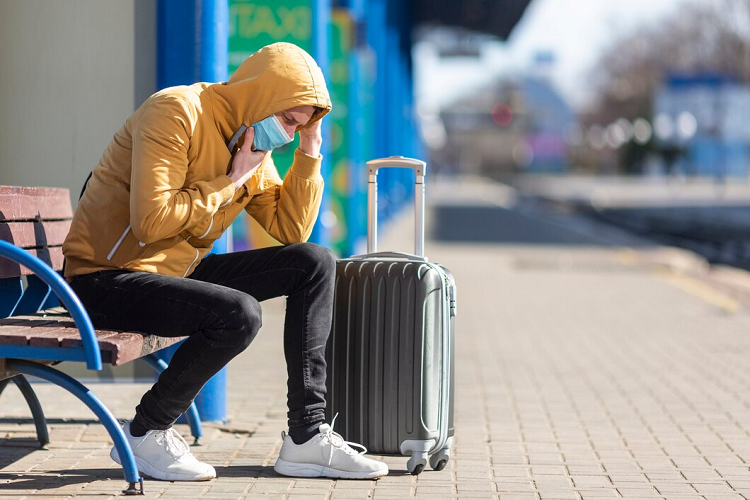Travel is full of unexpected moments – from flight delays to unexpected diversions. Yet, regarding your health, leaving things to chance isn’t the wisest choice. Pre-trip planning is the first line of defense against common health threats, especially during cold, flu and COVID season. Start by researching your destination’s health advisories and vaccine requirements. This will give you a clearer picture of what to expect and how to prepare. Make a checklist of health essentials: hand sanitizers, masks, tissues, and any prescribed medication. Packing these items ensures you’re not caught off guard should you start to feel under the weather. Lastly, stay updated about the current health situation in your travel location. Being informed will not only protect you but will also enable you to make conscious decisions about your activities and interactions during your trip.

The Importance of Regular Check-Ups
Often, travelers overlook the importance of regular check-ups before embarking on a journey. Consider it as a “health MOT” before a big trip. Regular visits to your primary care physician can provide insight into your current health status and any vulnerabilities that might make you more susceptible to catching colds, flu, or other viruses. A thorough check-up might uncover conditions that need management while you’re away. This could range from respiratory vulnerabilities to weakened immunity. By knowing these in advance, you can take extra precautions, such as avoiding crowded places or ensuring you have the necessary medication. Your doctor can provide specific advice tailored to your health needs and travel plans. This can include dietary recommendations, activity cautions, or even guidelines on managing jet lag without compromising your immunity.
Hydration and Nutrition – Your Secret Weapons
Just as a car runs best on quality fuel, your body needs proper hydration and nutrition to function optimally, especially during travel. The stress of journeying, coupled with the exposure to different environments, can take a toll on your body. To counteract this, you must prioritize consuming nutrient-rich foods and plenty of water. Start your day with a balanced breakfast. This could be a mix of proteins, whole grains, and fruits. While it’s tempting to try every local delicacy (and you should!), ensure that you also include veggies, lean meats, and other nutrient-packed foods in your daily diet. These not only provide you with the energy you need to explore but also arm your body with the necessary vitamins and minerals to fend off common viruses. Drinking water can be tricky while traveling, especially in areas where tap water isn’t safe. Always opt for bottled water and avoid ice in your drinks unless you know its source. Staying hydrated helps flush toxins and ensures the body’s defense mechanisms are working at their best.
Commit to Staying Active, No Matter the Destination
Keeping the body moving plays a crucial role in maintaining good health. While traveling, especially during the colder months, it’s easy to forgo your regular exercise routine in favor of cozy accommodations and hearty meals. However, integrating physical activity into your trip not only boosts your mood and energy levels but also strengthens your immune system. Exploring on foot is an excellent way to both sightsee and get your heart rate up. Opt for long walks, hikes, or even a quick morning jog to familiarize yourself with a new city. For those who prefer structured workouts, finding local gyms in Jacksonville FL, Boston, Richmond, or wherever you live is essential. These fitness centers often offer short-term passes for travelers, allowing you to stick to your workout regimen even miles away from home.
Prioritize Sleep and Recovery
Travel can be exhilarating, and there’s always a temptation to squeeze every moment out of your day. However, lack of sleep can quickly wear down your immune system, making you more susceptible to colds, flu, and other illnesses. It’s essential to listen to your body and give it the rest it needs. Try to maintain a regular sleep schedule, even when crossing time zones. If you’re experiencing jet lag, consider natural remedies like melatonin to reset your internal clock. Invest in a good eye mask and earplugs to block out unfamiliar sounds and lights in a new environment. Remember, a well-rested body is more resilient and can better ward off potential health threats.
Explore the Benefits of Elderberries
Natural remedies have been a staple in many cultures for centuries, and they can be particularly beneficial during travel. Among these, elderberries stand out for their immune-boosting properties. Rich in vitamins and antioxidants, elderberries can help reduce inflammation stress, and even protect the heart. While traveling, consider carrying elderberry supplements or syrup. These can provide an added layer of defense against viruses commonly circulating during the cold, flu and COVID season; besides the benefits of elderberries, research other local remedies or supplements that might benefit your specific health needs or concerns.
Mind Your Mental Health
Traveling can sometimes be stressful, from dealing with flight delays to navigating unfamiliar terrains. It’s essential to recognize the mental toll of travel and take steps to ensure your emotional well-being. Simple practices like meditation, deep breathing exercises, or even maintaining a travel journal can be therapeutic. Stay connected with loved ones back home, share your experiences, and don’t hesitate to seek local or online counseling services if you’re feeling particularly overwhelmed. A balanced mental state not only enhances your travel experience but also supports your body’s physical defenses.
Traveling during cold, flu, and COVID season demands a proactive approach to health. By integrating these guidelines into your travel plans, you can confidently explore, knowing that you’ve taken significant steps to protect your well-being. Safe and healthy travels!


